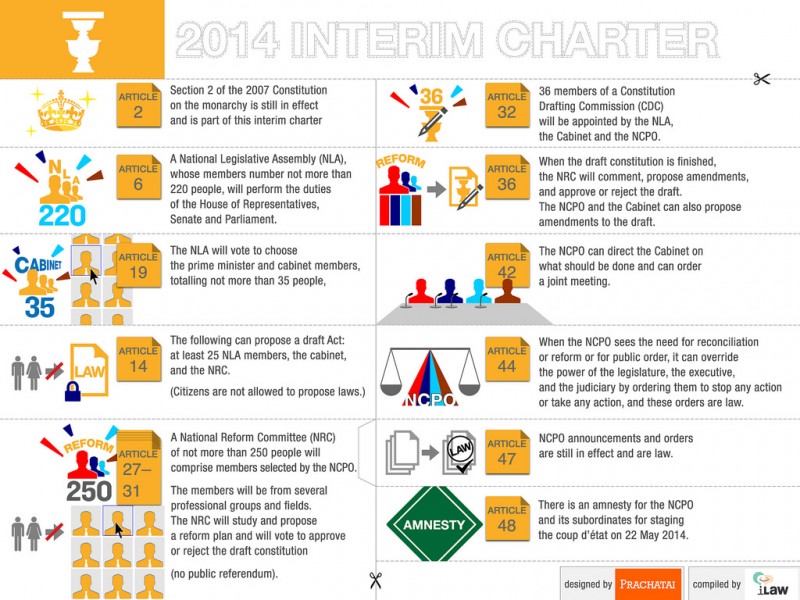Thailand’s military government, known as the National Council for Peace and Order (NCPO), has enacted an interim constitution that it claims will lead to democratic reforms in the country, but critics have pointed out that the new charter is designed to perpetuate a military dictatorship.
As summarized by the infographic above from independent online newspaper Prachatai, the constitution mandates the creation of several bodies that would govern the country, namely, the National Legislative Assembly (220 members), the National Reform Council (250 members), the Constitutional Drafting Committee (36 members), and the NCPO. It is the NCPO, or military leaders, who will choose the members of these bodies. Meanwhile, the prime minister and the cabinet (35 ministers) will be chosen by the legislative assembly.
King Bhumibol Adulyadej has already endorsed the constitution, boosting the legitimacy of the military government since the king is the most revered public figure in Thailand.
Thai junta leader Gen. Prayuth receiving a royally-endorsed interim constitution from HM King this evening. #ThaiCoup pic.twitter.com/Z5NBBHwvkQ
— Khaosod English (@KhaosodEnglish) July 22, 2014
The Royal Thai Army launched a coup on May 22, 2014 in a bid to end the violent conflict between Thailand’s major political forces. The army vowed to implement political and electoral reforms before handing back power to the civilian government.
The drafting of a new constitution was supposed to signal the country’s transition to civilian rule. But based on the 48 articles of the document, it seems the military will retain considerable power in the new government.
The Thai Citizens Against Dictatorship described the constitution as Thailand's “most anti-democratic constitution in half a century.” It questioned why the constitution will not be approved by a referendum:
The population will be force-fed with a permanent constitution that continues the junta's authoritarianism, only in a permanent form. This is all the more abominable because it is done in the name of “reform” for a better democracy.
Law scholar Khemthong Tonsakulrungruang criticized the “undemocratic features” of the constitution:
The drafter mandated that the new constitution must be “democratic, yet compatible with the Thai context”. What does Thai context mean? Are we to build a hypocritical, moral surrealist, ultra nationalist, strictly hierarchical version of democracy? The innovative vocabulary allows the new constitution to contain undemocratic features under the claim of Thainess.
The constitution has put several restrictions in selecting members of the legislative assembly. For example, a person who was a member of a political party in the last three years cannot join the body. Khaosod English, a Thailand newspaper, warned that this would allow military officials and their allies to dominate the interim government:
With all recently active political figures barred from the get-go, it’s almost certain that the interim government will be dominated by military personnel and their loyal allies.
Democrat Party chairman and former Prime Minister Abhisit Vejjajiva questioned Article 44 of the constitution, which empowers the NCPO to intervene in almost all aspects of governance:
Article 44 clearly states that the power has binding effect in legislative and judiciary aspects, without a process to challenge or scrutinize them. That means it’s the ability to issue a law or reverse a court verdict.
Human Rights Watch called the constitution a “charter for dictatorship” as it gives sweeping powers to the NCPO.
Reacting to these criticisms, Thai junta leader and army chief General Prayuth Chan-ocha justified the role of the military in strengthening the country’s democracy: “As long as power is used for good, there is no need to worry.”
After the enactment of the constitution, the NCPO appointed members of the legislative assembly. Discussions have also started about the reforms that Thailand needed to undertake in the next few months. But even with these initiatives, there are still bigger challenges and obstacles to overcome before Thailand can successfully reclaim its democracy.








9 comments